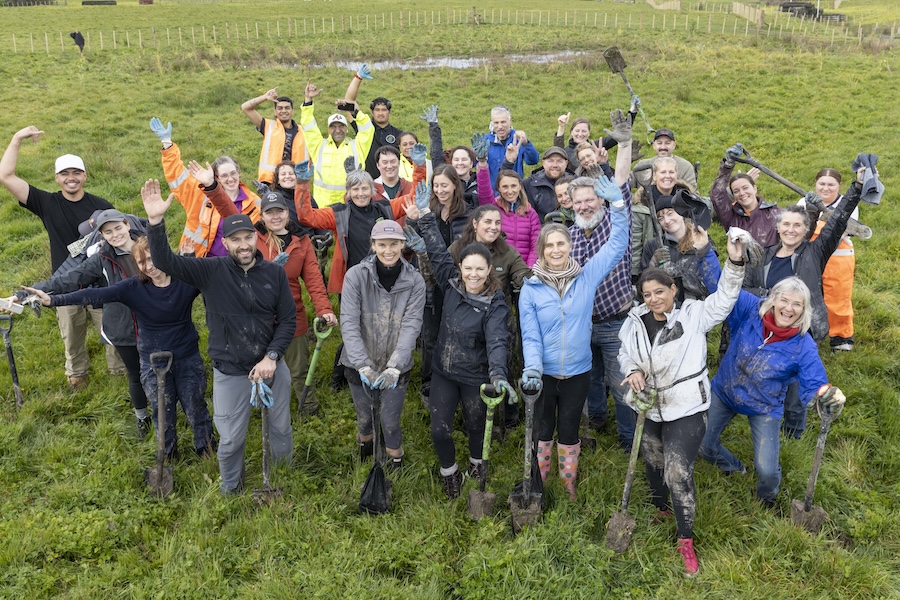NZ businesses are stepping up nature action, survey
A shift is underway in New Zealand’s business community around nature action, according to a new Sustainable Business Network (SBN) survey.
A survey of 64 businesses in July 2025 shows over half are actively participating in and investing in nature regeneration, an increase since 2023. For example, businesses are donating money to nature-related activities or they’re enabling staff to volunteer during work time to help with on-the-ground nature programmes, such as native planting and predator control.
From the margins to the mainstream
What was once the focus of a small group of pioneering, purpose-led companies is becoming a mainstream business movement. In New Zealand, 58 percent of businesses reported contributing to nature-related initiatives in 2025, which is up from 51 percent two years ago.
But this movement goes beyond financial donations. Businesses are leveraging their full range of resources – offering pro bono services, tools, equipment, strategic support and staff time to support nature outcomes. This signals a deeper cultural shift, as nature restoration is an opportunity for businesses to genuinely walk the talk.
Employee volunteering is a key part of this shift, with 50 percent of Kiwi businesses now enabling staff to contribute time to nature projects, according to the survey. When nature becomes embedded in business-as-usual – from the boardroom to frontline teams – it not only strengthens the social licence to operate, but also enhances employee wellbeing and staff retention.
Evolving focus
SBN’s survey reveals a shift in what’s driving business investment in nature. In 2023, brand purpose topped the list, motivating 76 percent of companies. While still important, this figure has dropped to 50 percent in 2025. In its place, more strategic priorities are emerging.
Climate change mitigation now leads the way, cited by 52 percent of businesses. Increasingly, companies are turning to nature-based solutions to cut their greenhouse gas emissions.
These shifts in New Zealand reflect global trends. The World Economic Forum highlights that nature-focused strategies are now seen as essential to achieving carbon reduction goals. Nature-based climate solutions, e.g. planting trees, restoring wetlands, improving soil health or green roofs for buildings, are expected to deliver at least 30% of the emissions reductions needed to meet businesses’ global 2030 targets.
This evolution marks a turning point. Action for nature is central to business resilience, cost efficiency and long-term success.
Investment trends
The results shows that 70 percent of businesses plan to increase their investment in nature-related activities over the next two years. These organisations are actively seeking projects that deliver business value and represent credible, trustworthy investment opportunities, e.g. adhering to certifications such as Fairtrade or organic, or supporting local nature restoration projects. For example, Kōkako Organic Coffee supports the Rotoehu Ecological Trust to help protect and restore the iconic North Island Kōkako.
What’s more, the focus is broadening. 75 percent of businesses now want their actions to support not just environmental outcomes, but cultural and social benefits too – up from 62 percent in 2023. This reflects a growing understanding that environmental and social outcomes go hand in hand.
2025: A turning point for business and nature
The survey tells a clear story: we’ve moved beyond awareness. Businesses are stepping up, engaging and embedding nature into their operations and decision-making. There is still work to do but the momentum for change is building.
Practical actions for SMEs:
- Understand your business’ relationship with nature – identify how your business impacts and depends on nature. Consider biodiversity (plants, animals and ecosystems), water use and quality (both marine and freshwater), soil health, land use changes, air quality and greenhouse gas emissions.
- Create practical actions – use this understanding to develop focused steps that remove or reduce your harm on nature.
- Create a business case – including your focus area, budget, timelines, success measures and who needs to be involved.
- Measure progress – set up a plan to track data and progress on your actions.
- Provide volunteer days for staff to be educated about nature and biodiversity
- Partner and collaborate – scale your actions by supporting local community groups, customers, suppliers, mana whenua and academics
- Embed and evolve – shift business models and advocate for nature through your networks and industry leadership.



